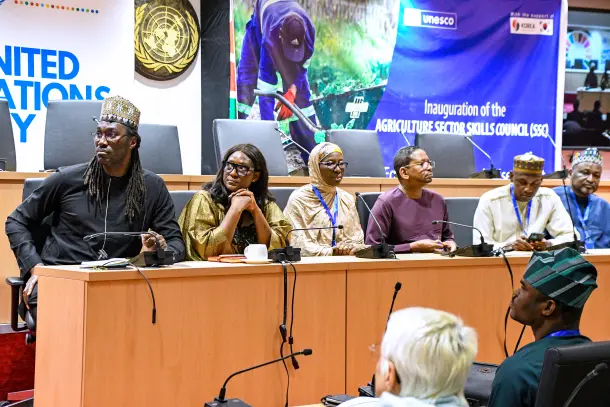Read in
The Skill Sector Council in Nigeria will support in aligning workforce training with industry needs and strengthening skills development in the agricultural sector.
UNESCO Abuja Office, in collaboration with the National Board for Technical Education (NBTE) and the Federal Ministry of Education, inaugurated the Nigerian Sector Skills Council for Agriculture (SSC4A) at the United Nations House in Abuja. This landmark event, part of the Better Education for Africa’s Rise (BEAR III) project funded by the Republic of Korea, aims to advance skills development in Nigeria’s agricultural sector, improve youth employment opportunities, and strengthen economies.
Sector Skills Councils (SSCs) are employer-led, sector-specific bodies designed to bridge the gap between industry demands and skills development systems. They play a vital role in aligning workforce training with the evolving needs of the labour market. The SSC4A will focus on strengthening skills development across the agricultural value chain. This achievement is closely aligned with BEAR III’s overarching goals of promoting youth empowerment, economic development, and reducing skill gaps in key sectors.
The event brought together a diverse array of stakeholders, including representatives from the Food and Agriculture Organization (FAO), the International Labour Organization (ILO), the National Power Training Institute of Nigeria (NAPTIN), and private sector leaders. Discussions focused on addressing skills gaps, improving workforce productivity, and fostering collaboration between public and private entities to ensure a holistic approach to agricultural workforce development.
Speaking at the event, the UNESCO Representative to Nigeria, Mr. Abdourahamane Diallo, underscored the importance of the SSC4A in driving agricultural transformation:
“Agriculture is not only a priority sector for Nigeria but also a critical driver of economic growth and employment,” he stated. “By enhancing skills training and development, we can unlock the immense potential of the sector, particularly for young people, and foster sustainable development.”
Professor Idris Bugaje, Executive Secretary of NBTE, highlighted the crucial role of SSCs in shaping a competitive workforce. “Sector Skills Councils promote a demand-driven approach to skills development, ensuring that training programs are aligned with industry needs,” he remarked. “The SSC4A will address existing skill gaps, enhance productivity, and strengthen the agricultural sector’s competitiveness.”
The Honourable Minister of Education, represented by Dr. Olodo M.A., Director of Technology and Science Education, at the Federal Ministry of Education, emphasized the role of agriculture in advancing food security, job creation, and poverty alleviation. “Agriculture is indispensable to Nigeria’s economic growth agenda,” she noted, highlighting the urgent need for coordinated skills training under the Nigerian Skills Qualification Framework (NSQF).
During the opening session, Mr. Dominique Koffy Kouacou, Representative (a.i) of FAO in Nigeria and ECOWAS, and Ms. Vanessa Phala, Director of ILO in Abuja, commended the establishment of the SSC4A. They reaffirmed the critical importance of agriculture as a priority sector for Nigeria’s economy and highlighted the immense opportunities it offers for youth empowerment and employment.
The success of the SSC4A hinges on the active engagement of public and private sector stakeholders. Speakers at the event stressed the important role of the sector in ensuring that training aligns with industry demands, fosters innovation, and enhances employability.
The event also featured technical sessions where the draft operational guidelines for sector skills councils in the delivery of National Skills Qualifications (NSQ) in Nigeria, were presented. Stakeholders provided valuable feedback on the guidelines, further enriching the development process. Panel discussions explored growth trends and skill gaps across agricultural sub-sectors, offering actionable insights to guide the SSC4A’s activities.
The Sector Skills Council for Agriculture (SSC4A) members were officially inaugurated by Dr. Olodo M. A., Director, Department of Technology and Science Education at the Federal Ministry of Education, representing the Honourable Minister of Education.



